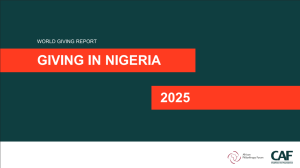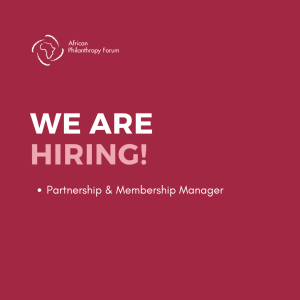By Noxolo Hlongwane; Head of Philanthropy: Nedbank Private Wealth
It has long been accepted that Africa is in dire need of a paradigm shift, or a systems reset, in order to equip and enable its people to address the long-standing challenges she continues to face. Covid-19 was a stark reminder of this reset imperative and, despite the many social, health and economic difficulties the pandemic created, it also raised awareness of the potential that exists across Africa for impactful, transformative intervention, delivered through a shared purpose and a unified vision of a better tomorrow for all.
Corporate philanthropy has a vital role to play in delivering this African transformation. The pandemic has heightened awareness of the interconnectedness between all citizens, whether individuals, communities, businesses or corporations. As we come to better recognise and understand this interconnectedness, the important role that businesses must play in supporting the societies in which they operate, and on which they depend, is becoming increasingly clear. As is the simple truth that effective and transformative social investment cannot be achieved if corporate philanthropy continues to be seen as secondary to other business activities.
Corporate social investment needs to become integral to business and forms one of the strategic pillars on which its sustainable success is achieved. Only by making such a core shift to strategically integrated corporate philanthropy, will organisations in Africa begin to achieve the scale and momentum that is needed for their social support efforts to become truly impactful.
Of course, there are challenges that need to be overcome before this required momentum and scale are achieved. It will almost certainly take a number of years for most businesses in Africa to fully recover to their pre-Covid-19 levels of operational effectiveness and profitability. The global economic crisis that came on the back of the pandemic impacted markedly on the already fragile economies of most African countries. From a corporate philanthropy perspective this means that there will now be less money available to businesses to use to provide the support needed by people and communities. Unfortunately, the need for such support has increased exponentially over the past year, creating an obvious social support supply and demand gap across much of the continent.
The pandemic has shown us that the historical corporate social responsibility (CSR) model is no longer effective in Africa, nor is it at all sustainable. What is needed, then, is an even more rapid transition to a corporate social investment (CSI) approach – one characterised by closer partnerships, being less focused on quantifying the value of the support provided, and more involved in the sustainable positive impact that such investment delivers.
Interestingly, the pandemic appears to have been the springboard that African businesses have needed to catapult them into this new way of approaching the social support they provide. We have seen significantly more collaboration between businesses, even across sectors and industries, that has amplified, and in many cases compounded, the positive impact delivered by these organisations. Such collaboration is crucial to the sustainability of impactful corporate philanthropy, particularly in an environment where funding is constrained, as is likely to be the case in Africa for a number of years to come. Working together in this way allows businesses of all sizes – even SMMEs – to make a meaningful contribution. It also enhances efficiencies, creates economies of scale, and has the potential to greatly amplify the return achieved on social investment in the form of greater reach and deeper, more permanent community impacts.
Importantly these collaboration commitments need to extend to the social partners that companies support. The past year highlighted just how vulnerable many social upliftment organisations and non-profits really are, and businesses need to be more deliberate in their efforts to invest not only in supporting the beneficiaries of these organisations, but also into building their own internal resilience and capacity. In turn, Africa’s social sector organisations also need to be more strategic in the partnerships they enter into. Rather than just seeking out short-term financial support, they need to build relationships with donor organisations that align with their vision, and that are willing to invest in their sustainability, whether financially or through the sharing of skills.
Another interesting lesson to come out of the pandemic has been the need for businesses to ensure that their CSI budgets include greater amounts of discretionary funding, or emergency savings accounts, if you will. Covid-19 arrived in Africa at a time when most companies had already allocated, or spent, most of their CSI budget allocations for 2020. To provide the support that was needed by communities, these companies had to either reconfigure their budgets or make additional discretionary funding available. Hopefully, this has created awareness in most organisations of the importance and value of building such discretionary funding into their CSI budgets, not only for global emergencies like a pandemic, but simply to ensure that their CSI and corporate philanthropy areas have the financial flexibility they need to quickly allocate resources as unexpected societal needs arise.
Ultimately, Covid-19 has reminded us that we live and work in a very different world, and these changes are intensified on a continent like Africa, which already faced massive challenges in terms of poverty, hunger, unemployment and health before the pandemic reached its shores. While governments have a vital role to play in terms of addressing these challenges, businesses must also shoulder a large portion of the responsibility – and the only way they will be effective in delivering on this responsibility is by transforming the way they approach social support, and committing to work together to ensure a rising African economic tide that will ultimately lift all boats.


